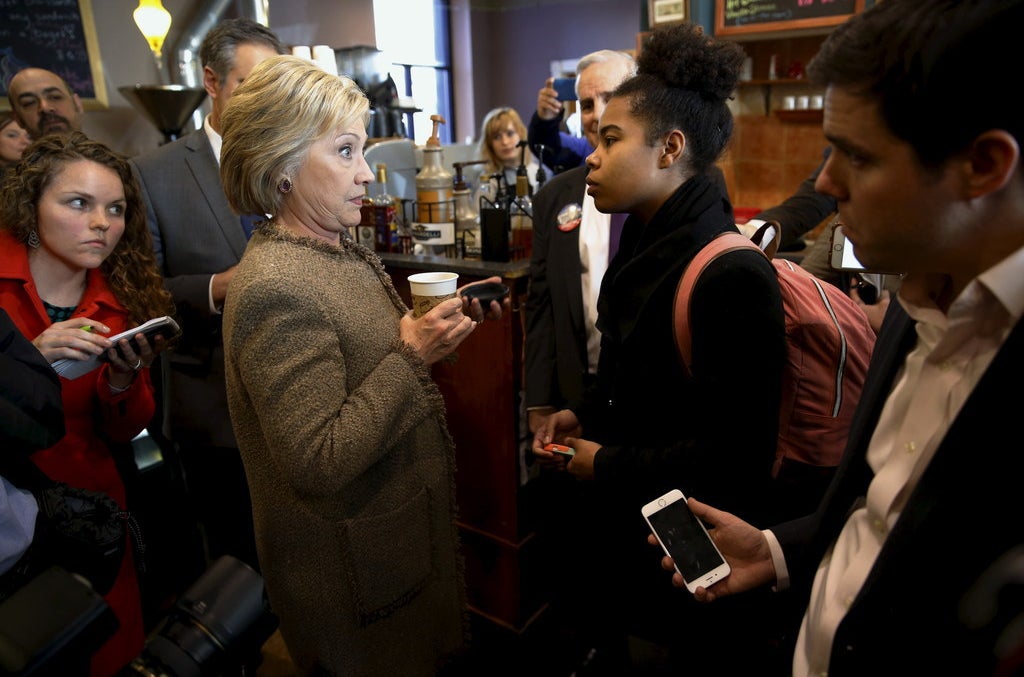

MINNEAPOLIS, Minn. — Near the back of Mapps Coffee shop in Minneapolis, as part of a last-minute trip to sway caucus-goers in this Super Tuesday state, a cheerful Hillary Clinton greeted voters with the usual pleasantries of retail politics.
“Hey, how are ya!”
“Good to see you!”
“Please caucus tonight!”
One by one, for some 15 minutes, people approached Clinton for a picture or a quick handshake, receiving-line style, before heading back to the front of the small café. But one voter, a young black woman who waited silently for her chance to speak with the candidate, stepped forward with a more contentious question — one that has now dogged Clinton on the trail during two separate confrontations.
“Hi,” Clinton greeted her. “How are you today?”
“I’d like to ask you a question,” the woman said.
“Sure.”
The voter spoke quietly. Her first question, only partially heard by reporters close enough to observe the full back-and-forth, concerned Clinton’s support for Somali immigrants, many of whom live in Minnesota — and what the woman referred to as “your super predator comments.” The exchange ended on a tense note, marking the second time in one week that a voter has questioned Clinton face-to-face about her 1996 speech referring to young people in gangs as “super-predators.”
Last week, a Black Lives Matter activist surprised Clinton with a question about the remark during a fundraiser in South Carolina. The exchange, videotaped and shared widely online, has since sparked further debate in the election over Clinton's role in and responsibility for 1990s criminal justice policy.
On Tuesday, the Minneapolis woman mentioned Clinton’s “super predator comments,” then asked, “Somalis are being stigmatized or criminalized [and] didn't have the chance to get acquainted with being an American. So I wanted to ask you, do you support this? Have you changed?”
“Look, first of all, that comment was made one time in my life,” Clinton said. The candidate could be heard telling the voter that she has “always been in favor” of supporting communities and “giving more people opportunities.”
The young woman was silent as Clinton spoke. “The first speech I gave in this campaign was about criminal justice reform, including ending profiling, banning the box, doing things that I think would be very helpful —"
“How do we know you’re going to be accountable to black communities now?” the woman said quickly.
“Well,” Clinton replied, “I think, you know, you can look at my history. I always have been, and you can look at the people —"
The woman indicated that she’d looked at the former first lady’s history. “And that’s not what happened,” she told Clinton flatly.
“Well, you know what? You haven’t looked at the whole thing,” Clinton responded. “And I'd be happy to give you more information. And the reason that so many black women across America support me is because they know me, they know what I’ve done, and they know that I mean what I say, and I will have a very comprehensive agenda to deal with a lot of the problems. And I'm very proud to have met with the Somali-American community, to have a lot of support in the Somali-American —"
The conversation, now a visibly uneasy exchange, drew aides and other reporters in closer.
“Who in the Somali-American community?” the woman asked.
“A lot of people, including a young councilman who was here who has helped me,” Clinton said, referring to Abdi Warsame, a Somali-American councilman here who came to Mapps Coffee shop to see Clinton and also sits on her campaign’s Minnesota Leadership Council. During a visit to the state in December, Clinton met privately with Warsame and a group of Minnesota Muslim leaders who have worked to stem domestic terrorism.
When the woman in the cafe indicated that Warsame, the councilman, is not in “the Somali community,” Clinton’s voice rose.
“You know what, dear? You have a different opinion. He is a Somali-American, elected to the City Council. I'm really proud of that,” Clinton said.
“Well, why don't you go run for something then,” said Clinton, responding to a comment from the Minneapolis woman that could not be heard by reporters or a Clinton aide who witnessed the conversation. There was one last remark from the questioner — also inaudible — before she turned, parted ways with Clinton, and exited the Minneapolis coffee shop before she could be identified.
“Good luck to you,” Clinton told her.
As if to dispel the tension, the candidate let out a small laugh, then greeted the next voter in line.

